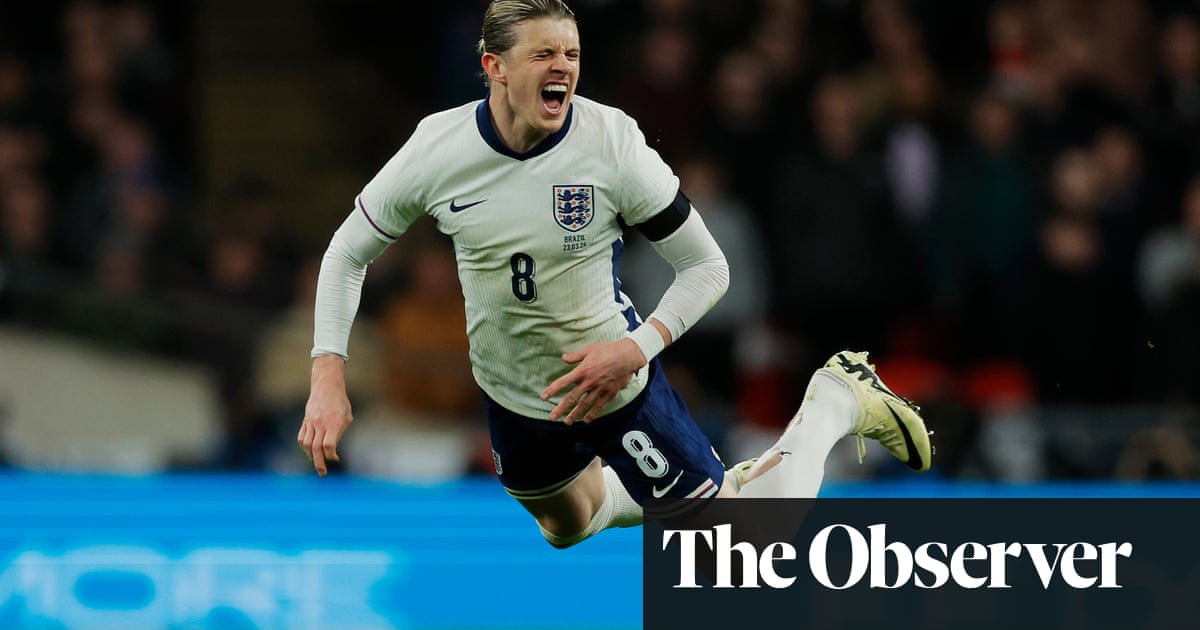And with a parp of the referee’s whistle, Conor Gallagher is away. England v Brazil is just seconds old, and already Gallagher is sprinting at full pelt, eating up the ground between him and João Gomes. Not in any real hope of winning the ball, which has gone long before he arrives. But just as a way of establishing his presence, showing intent. Planting the flag, as it were.
This, perhaps, is the defining motif of Gallagher in the mind’s eye: a midfielder whose dial is set permanently to hurricane, always busy, always keen to be seen as busy, whether ostentatiously playing a five-yard pass or tearing forward like a man chasing a runaway Mazda down a hill. He is one of English football’s great pointers: constantly barking orders, alerting teammates to open space and free runners. Coaches love Gallagher because he makes them feel a little less powerless.
Then, of course, there is the scurrying. And perhaps the scurrying and the pointing are really two sides of the same coin: a player who operates at a permanent level of high caffeine. Something always needs mending. Someone always needs to be somewhere else. And inevitably the solution is always more running, more tackling, more basic alpha energy.
“You get players that look really smooth,” Gareth Southgate once said of Gallagher. “And you can get players that scurry around the pitch. And he’s a bit of a scurrier.”
Perhaps it seems vaguely disparaging to reduce this clever and multifaceted player to a simple unit of leg-churning. But scurrying has always been one of the game’s underrated arts, and few international sides achieve greatness without it. France boast a whole lineage, from Christian Karembeu to Claude Makelélé to N’Golo Kanté to the current incumbent Adrien Rabiot. The great Brazil sides always had superb unsung scurriers: Clodoaldo, Mauro Silva, Gilberto Silva. Argentina have Rodrigo de Paul, Croatia have Marcelo Brozovic. And obviously these were players who could do far more, but whose function in that situation was to run and run, so the stars could flourish.
Increasingly, it’s becoming clear who the star of this England team is. The more you watch Jude Bellingham these days the more you realise how pivotal he is to the whole enterprise, the linchpin, the orchestrator, the baller. Who helps him play?
Certainly on durability alone, Gallagher seems like a better bet in that role than Jordan Henderson or Kalvin Phillips. And yet he still feels a slightly incongruent fit in an attack full of high-grade cutting edges. Bellingham, Phil Foden, Bukayo Saka when he returns: these are all guys who play high-IQ football in impossibly tight spaces. Gallagher is not quite in their class technically, not quite good enough in possession to function as a deep playmaker, not good enough at reading and anticipating to function as a holder.
Kobbie Mainoo gave Gareth Southgate plenty to ponder. Photograph: Matt Impey/ShutterstockThere were some tidy defensive contributions, as well as one nice run into the right channel that could have won a penalty. But he also gave the ball away more than any other player, had the lowest pass completion of any England starter bar Ollie Watkins, messed up a counterattack by taking too long to control the ball. And of course there is a certain irony in the fact that his smartest contribution – a dummy that allowed a pass to run through to Bellingham – was one in which he didn’t touch the ball at all.
Perhaps, to paraphrase the famous Churchill speech, Gallagher has little to offer but blood, toil, tears, sweat and very possibly an early yellow card in a crucial knockout game. But there is an alternative vision of England’s midfield out there, and with 15 minutes to play we got a glimpse of it, as the teenage prodigy Kobbie Mainoo jogged onto the field.
Mainoo, it scarcely needs to be said, is not one of the game’s great pointers. He is not a screamer nor a scurrier. If Gallagher tears and charges around the pitch, Mainoo slides around it like a chess piece. Everything here is economy of movement, economy of touch. He played 15 accurate passes out of 15. He produced one brilliant turn to squirm away from Gomes and set England on the attack. And of course, this was just his 24th game of senior professional football. The ceiling here is frightening, the potential still unknowable, the relationships largely ungrooved.
skip past newsletter promotionSign up to Football Daily
Kick off your evenings with the Guardian's take on the world of football
after newsletter promotion
How do I sign up for sport breaking news alerts?
Show- Download the Guardian app from the iOS App Store on iPhone or the Google Play store on Android by searching for 'The Guardian'.
- If you already have the Guardian app, make sure you’re on the most recent version.
- In the Guardian app, tap the Menu button at the bottom right, then go to Settings (the gear icon), then Notifications.
- Turn on sport notifications.
Does this count for or against him? Perhaps a little of both. Southgate, in his bones, is not a risk-taker or a boat-rocker. Bellingham has now been to two tournaments, but not until his third this summer will he be assured of a place in the starting XI. The ghosts of Henderson and Phillips still lurk around the place like a musty smell.
And for all Mainoo’s ability, for all the available history of teenage ballers ripping up major championships, for all the opportunity here to make a bold statement about the sort of team England want to be, a place on the fringes is probably about the most he can expect.
You can keep your Trent Alexander-Arnold and your Angel Gomes and your daring John Stones midfield experiment. For now, and in more ways than one, it is Gallagher making the running.
∎
